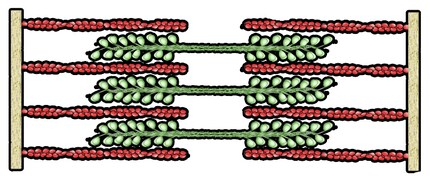
Background information
Roller goals: the benefits of fascia training
by Michael Restin

He hurts. I want him gone. It's the second worst hangover after the hangover. Sore muscles. An ailment that affects everyone at some point. So it's all the more surprising that it's still not entirely clear what happens in the body and how you can best get rid of it.
He'll definitely get me on the adductor press. Even with low weights and lots of repetitions, I know that sore muscles are inevitable and that I'll be typing around like an old man from the day after tomorrow at the latest. On the one hand, this indicates that I train my adductors too infrequently and, on the other, it is painful proof that eccentric movements are particularly hard. The controlled slackening when the muscle has to work against its own stretching is a real treat for the hangover, which is probably actually a catarrh (inflammation).
Have you trained excessively, done a tough hike in your legs or used muscles that you usually leave alone? Then you sometimes have one or two days left before the soreness hits full force. This is aptly referred to as "Delayed Onset Muscle Soreness", or DOMS for short. The visible damage to the muscles can be observed earlier. In the case of muscle soreness, tears can be detected in the Z-discs, which are the boundaries of the smallest contractile units of a muscle called sarcomeres. The body reacts to this with swelling. Unfortunately, this is not an indication of growing muscles; water simply penetrates and forms oedema. It only starts to hurt when the accompanying inflammation releases pain-triggering substances and literally gets on your nerves.

It is not yet clear exactly which processes are involved. And that won't help you if you have sore muscles again. After all, it disappears on its own and - if you don't continue to torment the affected areas - doesn't leave any permanent damage. Perhaps this is the reason why science has long ignored it. Not so long ago, lactate was blamed for the pain. This theory is now at least outdated and fascia researchers are setting out to take the muscle out of the hangover. They suspect the cause of the cat's pain lies in the connective tissue, where many pain receptors can be found. If this is confirmed, the proud term would be reduced to the only half as heroic-sounding fascia hangover.
Another question that is more likely to concern the average muscle sore owner: How do I get rid of it as quickly as possible? And how do I prevent it? Of course, a good warm-up programme is a must. This also includes a stretching programme. But is stretching before and immediately after exercise helpful or even harmful in terms of the expected muscle soreness? This is another controversial issue. A review of various studies on the topic concludes that the positive effects are minimal and negligible.
You risk making the problem even worse by stretching excessively. And by continuing to train relentlessly anyway. Relaxed walking, jogging and swimming, on the other hand, are more beneficial and not only promote regeneration processes. The improved blood circulation also reduces the feeling of pain. Light massages and fascia training can also have a positive effect on the perception of pain, but caution is advised with both. If you overdo it, it will only hurt more the next day. Heat, on the other hand, is undoubtedly pleasant. The best thing to do is go for a sauna session.
What, you don't have one? Then at least you can take comfort in the fact that professionals who have to compete in a lot of competitions in a short space of time don't get into the cosy warm relaxation pool after exercise, but often use cold water immersion for regeneration. Sounds complicated, but it's simply a dip in arse-cold water, often with ice cubes in it. Not everyone's cup of tea either.
Hot or cold? Move or immobilise? Stretch or simply relax and wait for the sore muscles to release their claws? If nothing is clearly right or wrong, personal preference also plays a role. For me, easy movement and a warm bath feel pretty right. My colleague Patrick Bardelli recently complained of sore muscles again and moved as if he had just turned 50. Now he has strapped on a booming, vibrating support corset that makes him look like Captain Future. But that's another story. It's possible that we'll get the next sore muscle while laughing.
What do you do when you have aches and pains?
The competition has ended.
Simple writer and dad of two who likes to be on the move, wading through everyday family life. Juggling several balls, I'll occasionally drop one. It could be a ball, or a remark. Or both.
Interesting facts about products, behind-the-scenes looks at manufacturers and deep-dives on interesting people.
Show all